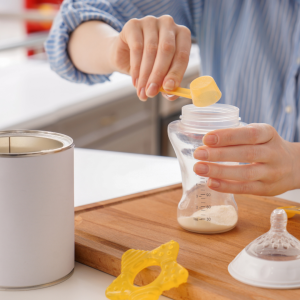Infant Formula Shortage: What Not to Do
 Infant formula shortages this spring have created a stressful situation for parents who want to ensure their children are receiving proper nutrition.
Infant formula shortages this spring have created a stressful situation for parents who want to ensure their children are receiving proper nutrition.
“We recognize this has been a frustrating time for parents and caregivers who rely on infant formula to feed their babies,” said Kathryn Patrick, RN, nurse manager for Springfield Memorial Hospital Family Maternity Suites. “But scrambling for a solution without paying attention to potential contamination issues or unregulated providers is not the answer.”
First, here’s what not to do:
- Do not add excess water to infant formula in an effort to make it last longer.
- Avoid making your own “homemade” infant formula, which can use too much water or include a mixture of nutrients babies can’t break down easily.
- Do not purchase infant formula from local or out-of-country companies online due to potential contamination and low or nonexistent regulation of formula.
Instead, talk with your pediatrician and make sure your infant hasn’t “aged” out of the need for formula or if there is a similar brand not affected by the shortage you can switch to. Often children older than 12 months can graduate from formula depending on their weight and general health.
For urgent needs, have your pediatrician screen for WIC resources. Check the local food bank and see if they have any available supply. The U.S. Department of Health and Human Services offers this list of potential resources as well.
Related Articles
The “Good Old Days” and Baby Safety
Snack Safety – Avoid Allergy Risks
National Poison Prevention Week – Stay Alert around Children